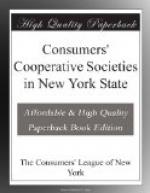It has been found that the policy determining function of the stockholders and Board of Directors cannot operate independently of the plans of the management. The two in a business organization must be closely inter-related. The stockholders have not tried to supervise the details of the business, as has sometimes been done to the disaster of cooperatives. The general manager instead has gone to the Board of Directors and sits there practically as a full member. As a result the policy function of the Board and the management function are closely linked together as they must be in a business that is to be permanent.
The stockholders are not idle, however. Through their committees, they have amended the by-laws. They have recently called a general meeting for the consideration of labor policy, and they publish monthly a little paper known as “The Cooperative Crier.” The average attendance at the shareholders’ monthly meetings is sixty or sixty-five.
To an unusual degree the success of Our Cooperative Cafeteria is bound up with its management, not only because it is technically expert, but because it is thoroughly imbued with the cooperative spirit. Around the first nucleus has grown a staff of intelligent young men and women, usually college bred, who are devoting all their brains and energy to see that this cooperative cafeteria succeeds. They seem to find a peculiar satisfaction in knowing that their efforts will not enrich a few individuals at the expense of patron and employee alike, but will increase the common welfare of the community itself.
Like other cooperatives, the cafeteria has found the need for expert and trained workers in place of the hard-pressed volunteer. Much of the work on education and cooperative organization is carried on by trained members of the staff. This interest of the paid employees in things other than mere technical efficiency contributes much to that friendly spirit which makes Our Cooperative Cafeteria unique among the restaurants of New York.
* * * * *
The Village Cooperative Society, Inc.
After nearly two years of discussion and meetings and after long consultation with experts a group composed largely of the housewives in Greenwich Village in the heart of New York City started in January, 1921, a cooperative laundry. The second-hand machinery which they purchased was not a laundry unit, the capacity of the washer being one-fourth that of the ironer; they had insufficient capital, half of it borrowed; they employed an inexperienced manager and a green bookkeeper; and for the first eight months the supervision was almost entirely carried on by volunteers, hard working, but without the foresight and power of control so essential to a new organization. Under these handicaps the cooperative laundry lost money every month.
It existed through those months due largely to two things. First, they were forced almost immediately to employ a new manager who consistently turned out high grade work, and secondly, a small group of volunteers put all their energy into making the thing a success.




